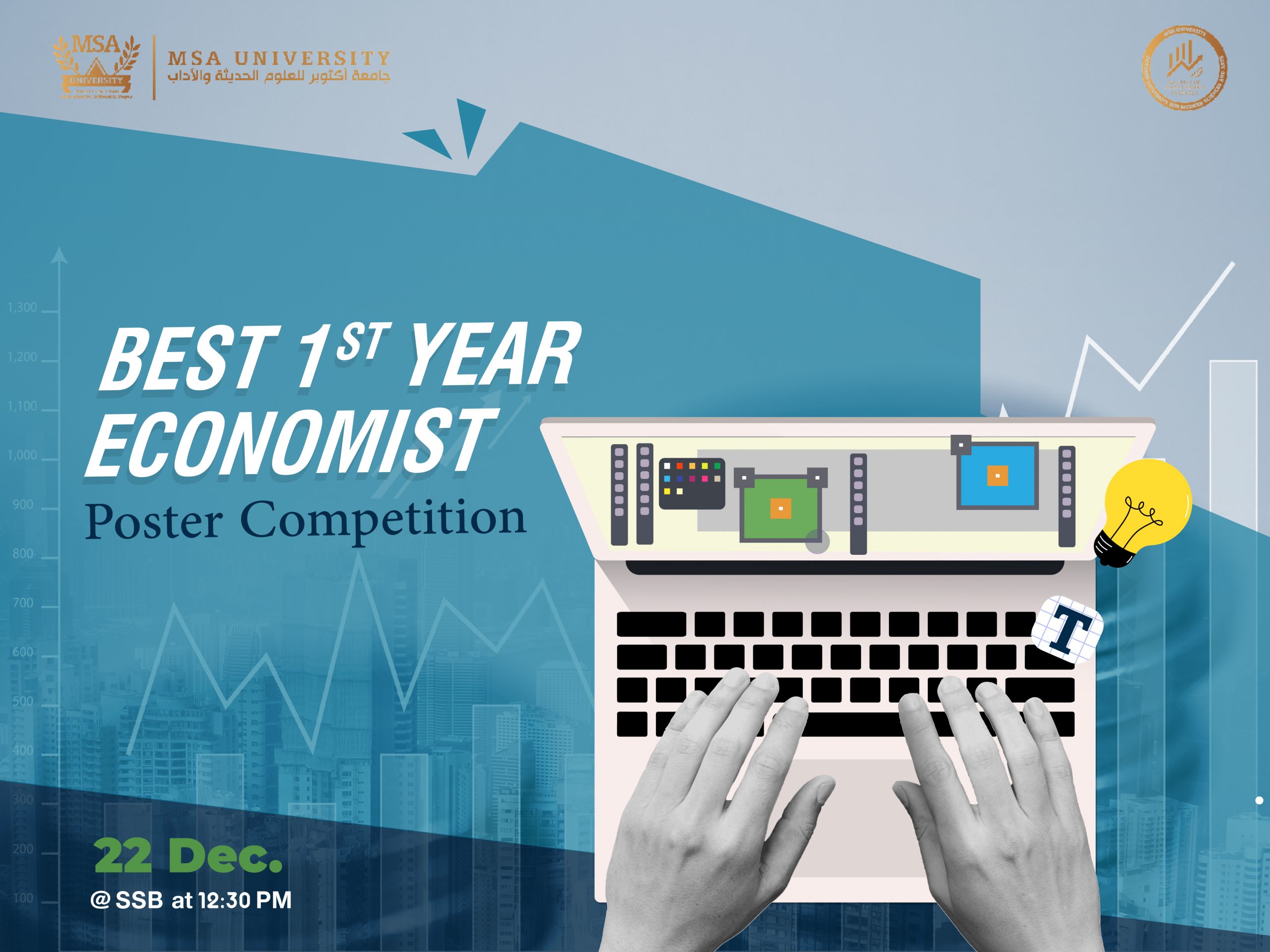The Economics Department at the Faculty of Management Sciences – October University for Modern Sciences and Arts (MSA) is excited to host The Best First-Year Economist Poster Competition. This semi-annual competition is about presenting a poster based on a theme stated by the organizing committee each semester on an economic problem. The contestants should propose a solution (or solutions) for it. The problem and the solution(s) should be included in the poster in a creative and catchy manner.
The poster is competition is open only to students in their first year in the Faculty and enrolled in an ECO101 or ECO102 class, but not to those studying courses higher levels economics courses.
Selected posters will be presented in the last week of classes using a poster, which is presented using ONE PowerPoint slide. A jury formed of Professor Heba Helmy, Head of the Economics Department, Dr. Mai Yasser, Associate Professor of Economics and Economics Programme Coordinator, Dr. Esmat Kamel, Dr. Amal Soliman and Dr. Amr Edriss, Assistant Professors of Economics, will evaluate the posters. Based on their evaluations, three certificates will be awarded for the first, second and third winner.
Fall 2025 Semester Theme
The theme of the competition this semester is:
Cooking Emissions: Research published in early 2025 found that volatile organic compounds (VOCs) from cooking contribute a substantial amount of ozone-forming pollution, sometimes rivaling that from motor vehicles, according to NOAA (https://research.noaa.gov/cooking-emissions-rival-fossil-fuels-as-an-ozone-pollution-source-in-los-angeles/). How can we save our environment from cooking emissions?
Objective: The purpose of the event is to encourage first-year students to think critically about the value of protecting the environment and to artistically share their ideas for sustainable practices. It also attempts to inspire students’ imaginations and creativity, push them to think creatively, and use art to advocate for environmental conservation. Students demonstrate their abilities and dedication to environmental awareness by actively participating and producing creative and thought-provoking posters. The poster and the five-minute presentation of the problem and its solution must show a clear understanding of the six cornerstones of the economic way of thinking.
Rules of the Competition
1. Participants must be undergraduate students in economics enrolled in an ECO101 class in the fall semester or an ECO102 class in the spring semester.
2. The participants are selected by the course instructor of each class. Each class will be represented by one group in the final stage. If several groups wish to participate the instructor will select the best.
3. Participants should not have previously shared in the competition.
4. The poster theme is decided each semester by the organizing committee and is related to an economic problem. The contestants should propose a solution for it, using a Poster that summarizes the problem and the solution in a creative and catchy manner.
5. The posters that are submitted must be original, and in their final versions.
6. Each poster will be formed by a group of 2 – 3 students.
7. In the last stage, posters will be presented by the group members for a maximum of five minutes. Three minutes will be devoted to your presentation of the poster and two minutes for questions from the jury.
8. The poster will consist of a single PowerPoint slide.
9. The poster cannot include more than 100 words in text, and include images, figures, graphs, etc.
10. All participants must be able to present the poster to the jury.
11. The poster and the five-minute presentation of the problem and its solution must show a clear understanding of the economics way of thinking
Stages of the Contest:
The contest consists of the following four stages:
1. First stage: Announcement of the theme will be in October in the fall semester, and March in the spring semester.
2. Second stage: Each instructor of an ECO101 or ECO102 class will select one team to represent his/her class. In case several groups wish to compete, the instructor will select the best team to represent his/her class. The names of the teams will be given to the organizing committee on November 31 in the first semester, and April 30 in the second semester.
3. Third stage: On the last Monday of the last week of the semester, the participants will present their posters personally in a five-minute presentation in front of a jury formed of their economics instructors. The place of the presentation will be announced prior to the presentation.
4. Fourth stage: The first three winning posters will be selected. In case of a tie between two or more posters, the winner will be equally divided between the participants.
Awards:
1. First place: The first group winners will receive a certificate of achievement entitled ‘The Best First-Year Economist’
2. Second place: The second group winners will receive a certificate of achievement ‘The Second Best First-Year Economist’
3. Third place: The third group winners will receive a certificate of achievement ‘The Third Best First-Year Economist’
Key Steps:
Students should follow the following steps:
1. Planning and Content: Determine the core message, findings, or arguments to be conveyed. Prioritize the most important information and consider the target audience.
2. Structure: Organize the poster logically.
3. Visual Elements: Choose appropriate images, graphs, and tables to support the text and make the poster visually engaging.
4. Conciseness: Use minimal text and avoid lengthy paragraphs. Focus on key points and use visuals to convey information effectively.
5. Design and Layout: Visual Appeal: Use contrasting colors for readability and ensure a clean, uncluttered layout. Font Choice: Select a readable font and ensure text sizes are appropriate for the viewing distance.
6. Review and Feedback: Seek feedback from colleagues or supervisors on the content, clarity, and visual appeal of the poster. Compliance: Ensure the poster adheres to the specific theme of the competition.
7. Presentation: Practice: Rehearse a brief presentation summarizing the poster’s key points. Engage: Be prepared to answer questions and provide more detailed explanations of the poster’s content. Enthusiasm: Present with confidence and enthusiasm to effectively communicate the research or information.

